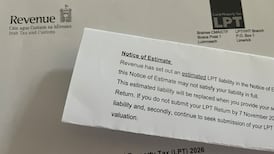SECOND OPINION:A few years ago I brought one of my children to hospital with what I suspected was a broken wrist. The consultant, who was medically brilliant, was very patronising. He called me "mother" every time he spoke to me, even though my full name was on the admission form. I finally felt obliged to say, "Please call me either Jacky or Mrs Jones, whichever you prefer." He looked strangely at me so I was more specific and said I did not want to be called mother.
He expertly finished treating my child, calling me nothing at all for the rest of the consultation. This may seem trivial, mere cavilling, yet categorising women as “mothers” goes to the heart of Ireland’s 30-year abortion debate.
Women are referred to as mothers by most contributors to this debate, including during the recent Oireachtas abortion hearings. Catholic bishops spoke about “our two-patient model” for maternity services, meaning woman and child are seen as one unit.
The problem with this is that mother is a role, not a person, and providing medical services for a role is not only sexist but bad practice. The use of the mother word instead of woman seems normal to most people, because mother is routinely used by the Irish Constitution, the courts and the medical profession. Article 40.3.3 says “The State acknowledges the right to life of the unborn and, with due regard to the equal right to life of the mother, guarantees in its laws to respect, and, as far as practicable, by its laws to defend and vindicate that right.” The 1992 Supreme Court judgment in the X case referred to “the real and substantial risk to the life, as distinct from the health, of the mother”. The Medical Council guidelines state, “The Council recognises that termination of pregnancy can occur when there is a real and substantial risk to the life of the mother.”
Seeing women as mother and foetus-breeding pods, where one cannot be treated without the other, skews any discussion on abortion. Women have the right to be treated as equal, responsible, capable human beings, independent of any roles they may assume. Women are entitled to medical services in their own right, including abortion. There are no references to fathers in the Constitution, even though men behave less responsibly than women when it comes to pregnancy and born children. During the committee hearings fathers were not mentioned once. Where do they fit into the crisis-pregnancy story?
Misogyny is defined as distrust and dislike, even hatred, of women and girls. Some contributors to the committee hearings demonstrated misogynistic attitudes, insinuating that women are devious and would try to manipulate doctors, pretending to be suicidal in order to obtain an abortion.
There is no evidence that this happens in countries where abortion is widely available. The UN World Abortion Policies 2011 report shows there are no significant differences between Ireland’s current abortion rates and those of Austria, Germany and Greece, which permit abortion at the woman’s request. In addition, 96 per cent of developed countries, including Europe, permit abortion to save a woman’s life, and 88 per cent permit abortion to preserve her mental and physical health. Ireland’s current abortion laws are the same as Afghanistan, Angola and Somalia, all deeply misogynistic societies.
Ireland is also a misogynistic society. Last week a Circuit Court judge ruled that a Garda sergeant saying, “I’d say you’re some screamer in bed,” to a female work colleague could have been made “in a jocose fashion”.
Irish women are 58 times more likely than men to be looking after home and family. Affordable State-funded childcare is nonexistent, meaning women cannot participate in society as citizens equal to men. This inequality is seen as natural and is supported by Article 41.2.2 of the Constitution: “The State shall, therefore, endeavour to ensure that mothers shall not be obliged by economic necessity to engage in labour to the neglect of their duties in the home.”
It is impossible to have a rational debate on abortion when women are categorised as mothers whose lives are valued as equal to foetuses.
We need an immediate referendum to remove all references to mothers from the Constitution. New abortion laws need to include protection for a woman’s mental and physical health, even if she is not suicidal. It is time to see Irish women as people with human rights, not just as mothers.
Dr JACKY JONESis a former HSE manager of health promotion









